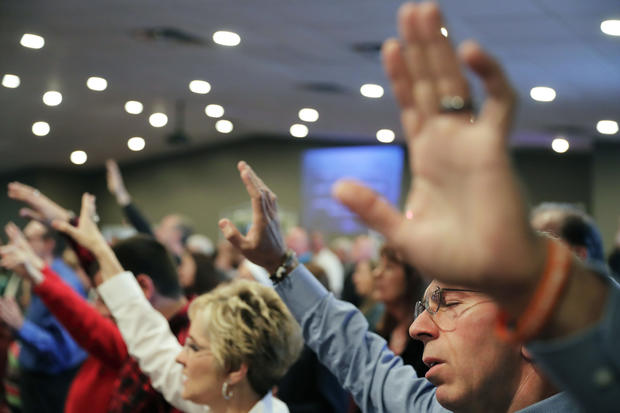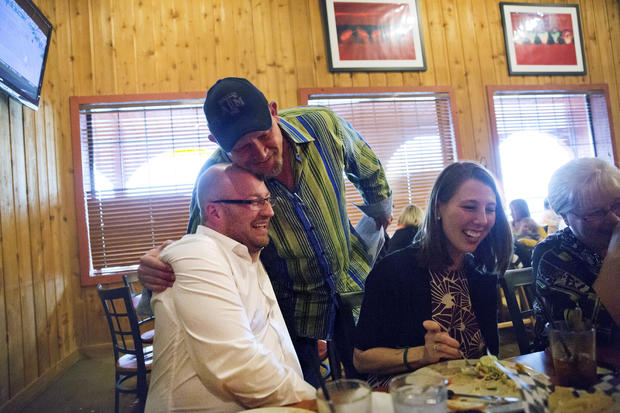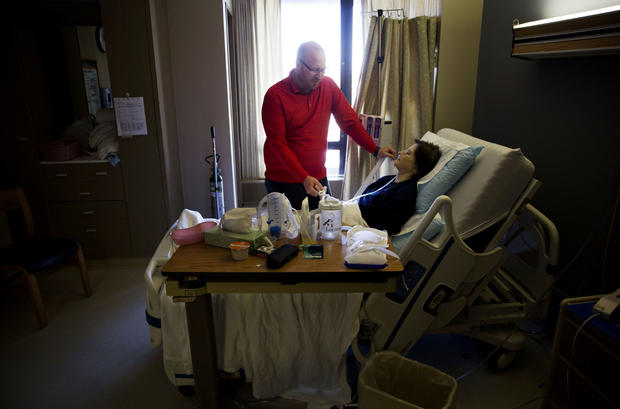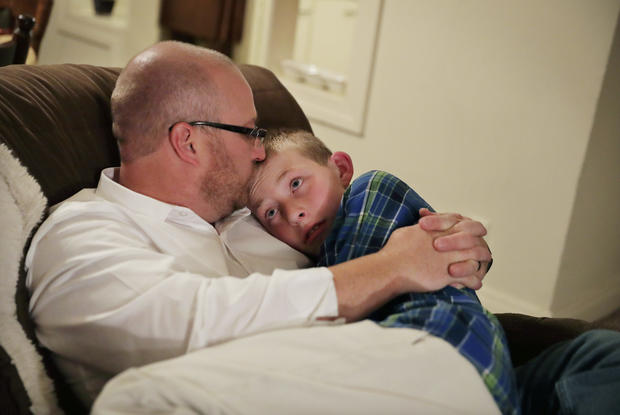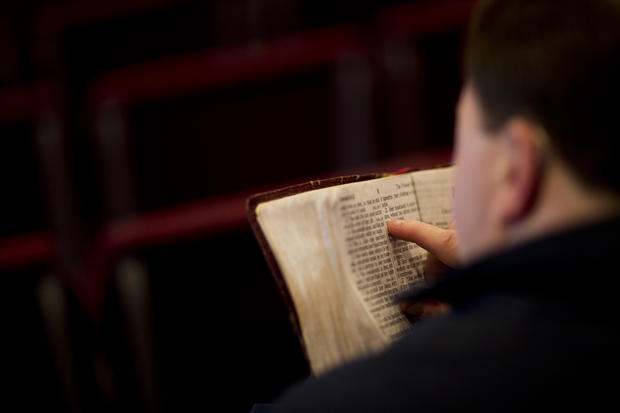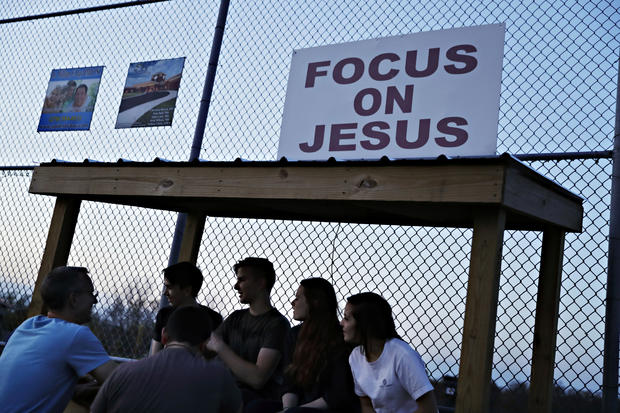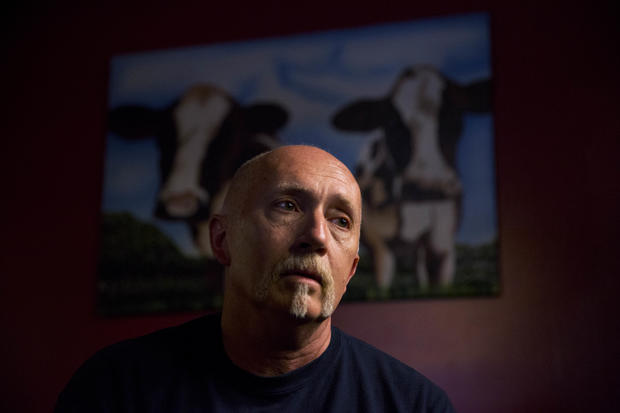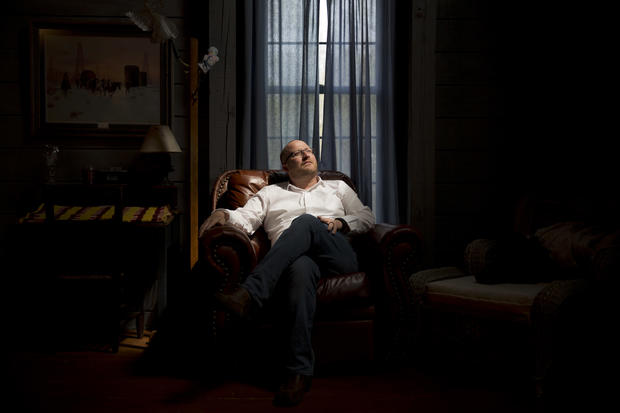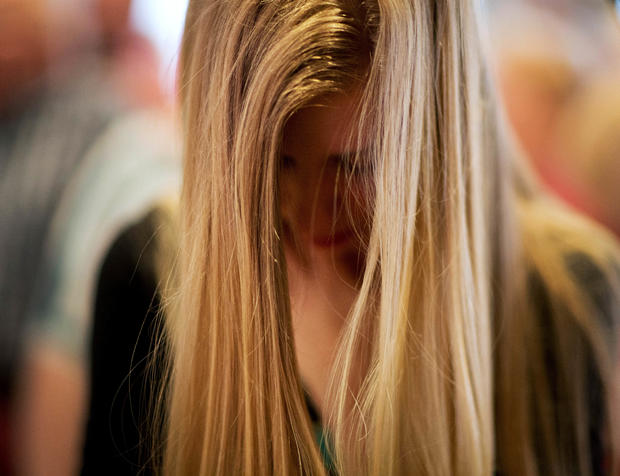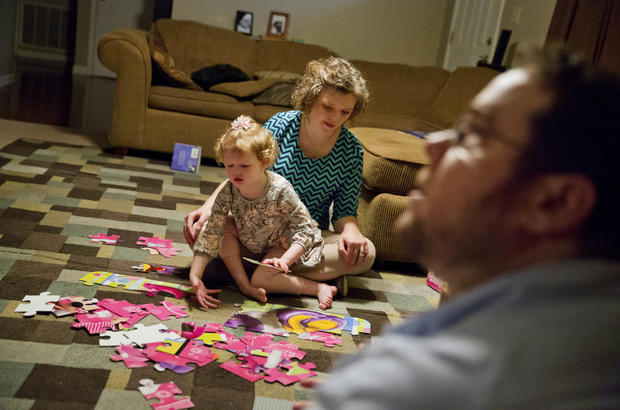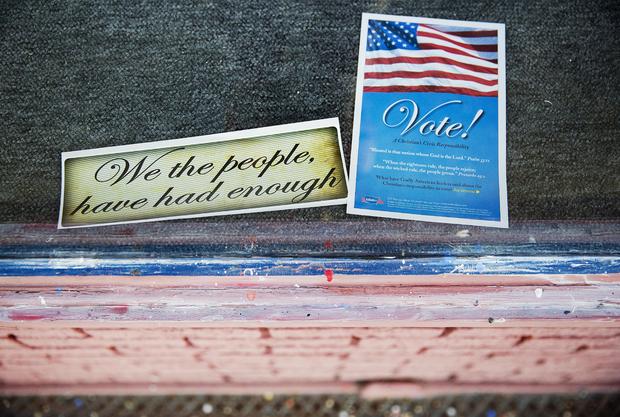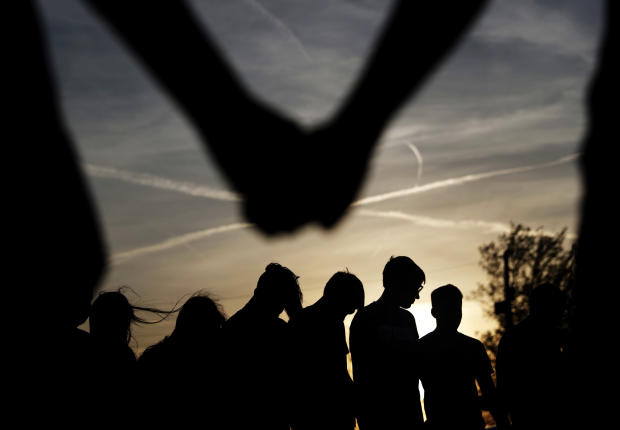Divided America: Anxious Christians
The faithful in the pews needed little convincing. Even in this deeply religious swath of western Kentucky -- a state where about half the residents are evangelical -- conservative Christians feel under siege.
For decades, they say, they have been steadily pushed to the sidelines of American life and have come under attack for their most deeply held beliefs, born of their reading of Scripture and their religious mandate to evangelize. The 1960s ban on prayer in public schools is still a fresh wound. Every legal challenge to a public Nativity scene or Ten Commandments display is another marginalization. They've been "steamrolled," they say, and "misunderstood."
Religious conservatives could once count on their neighbors to at least share their view of marriage. Those days are gone. Public opinion on same-sex relationships had turned against conservatives even before the U.S. Supreme Court legalized gay marriage nationwide last year.
This feature is part of an AP series on Divided America ahead of the presidential election.
Here, parishioners pray during a service at the Christian Fellowship Church in Benton, Ky, April 10, 2016.
Anxious Christians
Now, many evangelicals say liberals want to seal their cultural victory by silencing the church. Liberals call this paranoid. But evangelicals see evidence of the threat in every new uproar over someone asserting a right to refuse recognition of same-sex marriages -- whether it be a baker, a government clerk, or the leaders of religious charities and schools.
Richie Clendenen, lead pastor at Christian Fellowship Church, prays for President Barack Obama, considering it a Christian duty no matter his opposition to the president's policies. But Clendenen believes few Americans who support same-sex marriage would show him or his fellow evangelicals a similar level of respect. ''On any front that we speak on, we're given this label of intolerance, we're given this label of hate," Clendenen said.
Clendenen, at left, is embraced by congregant Judd Deaton, after a service while dining with his wife Jenny at a restaurant in Benton, Ky, April 10, 2016.
Anxious Christians
America's divisions -- right-left, urban-rural, black-white and more -- spill daily into people's lives, from their relations with each other, to their harsh communications on social media, to their decisions in an acrimonious presidential election campaign. Many Christian conservatives feel there is another, less recognized chasm in American life, and they find themselves on the other side of the divide between "us" and "them."
Pastor Richie Clendenen uses the word persecution to describe what Christians are facing in the U.S., even though he feels strange doing so. He has traveled extensively to help start churches in other countries, and says he knows the violence many Christians endure. "There's nobody hated more in this nation than Christians," he said, amid nods and cries of encouragement. "Welcome to America's most wanted: You."
Clendenen prays with congregant Cathy Rutledge in the hospital as she recovers from a bout of pneumonia in Paducah, Ky, April 12, 2016.
Anxious Christians
"I feel like we're being made to accept everything that everybody else has said," explained Clendenen, "but at the same time our ideas, the truth that we hold so dear and the word of God isn't being tolerated whatsoever."
For evangelicals like those at Christian Fellowship, the sense of a painful reckoning is not just imagined; their declining clout in public life can be measured.
The turnabout is astonishing and hard to grasp -- for them and for other Americans -- since the U.S. remains solidly religious and Christian, and evangelicals are still a formidable bloc in the Republican Party. But a series of losses in church membership and in public policy battles, along with America's changing demographics, are weakening evangelical influence, even in some of the most conservative regions of the country.
Clendenen holds his son Trey, 11, after returning home from conducting an evening service, in Benton, Ky, April 10, 2016.
Anxious Christians
"The shift in the last few years has really been stunning," said Ed Stetzer, executive director of Lifeway Research, an evangelical consulting firm in Nashville, Tennessee. "Nobody would have guessed the pace of change. That's why so many people are yelling we have to take our country back."
The congregation is one of more than 80 in the surrounding community, by pastor Richie Clendenen's count. Yet, even in this deeply religious swath of western Kentucky, a state where about half the residents are evangelical, conservative Christians feel under siege. They say that, for decades, they have been steadily pushed to the sidelines of American life and have come under attack for their most deeply held beliefs.
It was on the other side of Kentucky, in Rowan County, where clerk Kim Davis spent five days in jail last year for refusing on religious grounds to issue marriage licenses to same-sex couples since the licenses would include her name. Gov. Matt Bevin recently tried to defuse the conflict by signing a bill creating a form without a clerk's name.
A parishioner reads the bible before a service at the Christian Fellowship Church in Benton, Ky, April 10, 2016.
Anxious Christians
The Protestant majority that dominated American culture through the nation's history is now a Protestant minority. Their share of the population dipped below 50 percent sometime after 2008.
Liberal-leaning Protestant groups, such as Presbyterians and Lutherans, started shrinking earlier, but some evangelical churches are now in decline. The conservative Southern Baptist Convention lost 200,000 from its ranks in 2014 alone, dropping to 15.5 million, its smallest number in more than two decades.
The trend is reflected in the highest reaches of public life. The U.S. Supreme Court is now comprised completely of Jews and Roman Catholics. In the 2012 presidential election, the Republican nominees were a Mormon, Mitt Romney, and a Catholic, Paul Ryan.
"We've lost our home field advantage," Stetzer said.
At the same time, the Bible Belt, as a cultural force, is collapsing, said the Rev. Russell Moore, head of the Southern Baptist public policy agency.
Youths sit under a sign at a baseball field during a gathering at dusk outside the Christian Fellowship Church in Benton, Ky, April 10, 2016.
Anxious Christians
In the 2004 election, Americans appeared to be on the same page, approving bans on same-sex marriage in all 11 states where the measures were on the ballot. When President Barack Obama was first elected in 2008, just four in 10 Americans supported gay marriage. But three years later, support rose to more than five in 10. And now the business wing of the Republican Party is deserting social conservatives on the issue, largely backing anti-discrimination policies for gays and transgender people.
"If a homosexual couple comes in and wants a cake, then that's fine. I mean I'll do it as long as I'm free to speak my truth to them," said Daniel Slayden, owner of Parcell's Deli, Grille and Bakery in Benton, KY, April 11, 2016. "I don't want to get any point to where I have to say or accept that their belief is the truth."
The problem, many religious conservatives say, is that government is growing more coercive in many areas bearing on their beliefs
Anxious Christians
No issue has more starkly illuminated conservative Christians' waning influence than the struggle over same-sex marriage.
Clendenen said he saw "a lot of fear, a lot of anger" in his church after the Supreme Court ruling. He said it made him feel that Christians like him had been pushed to the edge of a cliff.
Politically, old guard religious right organizations, such as the Moral Majority and the Christian Coalition, are greatly diminished or altogether gone, and no broadly unifying leader or organization has replaced them.
In this year's presidential race, the social policy issues championed by Christian conservatives are not central, even amid the furor over bathroom access for transgender people.
Clendenen, after conducting a church service in Benton, April 10, 2016.
Anxious Christians
Nearly a quarter of Americans say they no longer affiliate with a faith tradition. It's the highest share ever recorded in surveys, indicating the stigma for not being religious has eased -- even in heavily evangelical areas. Americans who say they have no ties to organized religion, dubbed "nones," now make up about 23 percent of the population, just behind evangelicals, who comprise about 25 percent, according to the Pew Research Center
Parishioner Megan Wagner bows her head in prayer during a service at the Christian Fellowship Church in Benton, Ky, April 10, 2016.
Anxious Christians
Clendenen said many in his church backed Texas Sen. Ted Cruz, who had positioned himself in the Republican primaries as the standard bearer for religious conservatives.
Chris Haynes (R), who plays in the church worship band and teaches communications at Murray State, said he voted for John Kasich in the primary. Some congregants now support presumptive nominee Donald Trump -- a thrice-married, profane casino magnate with a record of positions at odds with social conservatism. Haynes said Trump brings out the worst in people. "It's like we're scraping the bottom of the barrel,'' said Brandi Haynes.
Brandi, rear and her husband Chris Haynes, near, sit on the living room floor of their home as their daughter, Evie, 3, puts a puzzle together in Murray, Ky, April 11, 2016.
Anxious Christians
Most conservative Christians fall into one of three broad camps.
There are those who are determined to even more fiercely wage the culture wars, demanding the broadest possible religious exemptions from recognizing same-sex marriage.
There are those who plan to withdraw as much as possible into their own communities to preserve their faith --an approach dubbed the "Benedict Option," for a fifth-century saint who, disgusted by the decadence of Rome, fled to the forest where he lived as a hermit and prayed.
There is, however, a segment that advocates living as a "prophetic minority," confidently upholding their beliefs but in a gentler way that rejects the aggressive tone of the old religious right and takes up other issues, such as ending human trafficking, that can cross ideological lines.
Leaflets sit in the window of the local Republican party office in Benton, Ky, April 10, 2016.
Anxious Christians
It has come to this: Many conservative Christians just don't feel welcome in their own country.
They say they are either mocked or erased in popular culture. "When was the last time you saw an evangelical or conservative Christian character portrayed positively on TV?" Stetzer asked.
"The idea of what we call biblical morality in our culture at large is completely laughed at and spurned as nonsense," said David Parish, a former pastor at Christian Fellowship and the son of its founder. "The church as an institution, as a public entity -- we are moving more and more in conflict with the culture and with other agendas."
Trump uses rhetoric that has resonance for Christian conservatives who fear their teachings on marriage will soon be outlawed as hate speech.
"We're going to protect Christianity and I can say that," Trump has said. "I don't have to be politically correct."
Youths hold hands for a prayer during a gathering at sunset outside the Christian Fellowship Church in Benton, Ky, April 10, 2016.
Photographs by David Goldman/AP
